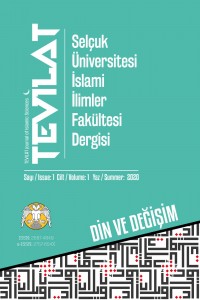Abstract
Çalışma, temel olarak tarih içinde İslam disiplinlerinin kapladığı alanı ve modern toplumsal değişim süreci sonunda İlahiyat'a dönüşen yüksek din eğitim-öğretiminin tarihini, işlevini ve müfredatını ele alıyor.
References
- Ephrat, Daphna. “Religious Leadership and Associations in the Public Sphere of Seljuk Baghdad,” Miriam Hoexter, Shmuel N. Eisenstadt, Nehemia Levtzion (ed.). The Public Sphere in Early Muslim Societies (Albany: State University of New York Press, 2002) içinde, ss.31-48.
- Heyd, Uriel. “The Ottoman ʿUlemā and Westernization in the Time of Selim III and Mahmud II,” Studies in Islamic History and Civilization: Scripta Hierosolymitana, c.IX (1961), ss.63-96.
- Hiro, Dilip. Islamic Fundamentalism, Justin Wintle (series ed.). London: Paladin Grafton Books, 1988.
- Rıfkı, Falih. “Ocak Söndürmek de Meziyet İmiş,” Sebīlurreşād (9 Teşrin-i Evvel 1340) XXIV:620 (1925), ss.348-349.
- El-Sayed, Afaf Loutfi. “The Role of ʿulamāʾ in Egypt during the Early Ninenteenth Century,” P. M. Holt (ed.). Political and Social Change in Modern Egypt (London: Oxford University Press, 1968) içinde, ss.264 -280.
- Zengin, Salih Zeki. II. Abdülhamit Dönemi Örgün Eğitim Kurumlarında Din Eğitimi ve Öğretimi: 1876-1908: Adana: Baki Kitabevi, 2003.
- Zengin, Salih Zeki. Medreseden Daru’l-Fununa Türkiye’de Yüksek Din Eğitimi. Adana: Karahan Yayınevi, 2009.
On The Nature of İlahiyat As a Higher Religious Education Institution in The Course of Transition to Modernity
Abstract
There was a conscious effort of the Muslim community, which started from the very early days, to transfer the knowledge of the Islamic religion to the next generations. In a short time, source texts, methods for their interpretation and disciplines that interpret them emerged. The education and training of the basic Islamic disciplines for many centuries were carried out by a sophisticated madrasah institution. The one who runs this institution and transfers the values of the religion of Islam into life was ulama. The ulama also occupied a key position in the social structure between the government and the people. In a world where modernity has been increasingly dominant, the position of religion has changed and the ulama, who is responsible for learning, teaching and applying it, is no longer visible in the social structure. Parallel to the social change in the process of modernity, religious education and training and institutions have been shaped according to the new situation and satisfied with different purposes than before. During this period, the content of the İlahiyat as a higher religious education institution has been determined according to this eventual situation.
Keywords
References
- Ephrat, Daphna. “Religious Leadership and Associations in the Public Sphere of Seljuk Baghdad,” Miriam Hoexter, Shmuel N. Eisenstadt, Nehemia Levtzion (ed.). The Public Sphere in Early Muslim Societies (Albany: State University of New York Press, 2002) içinde, ss.31-48.
- Heyd, Uriel. “The Ottoman ʿUlemā and Westernization in the Time of Selim III and Mahmud II,” Studies in Islamic History and Civilization: Scripta Hierosolymitana, c.IX (1961), ss.63-96.
- Hiro, Dilip. Islamic Fundamentalism, Justin Wintle (series ed.). London: Paladin Grafton Books, 1988.
- Rıfkı, Falih. “Ocak Söndürmek de Meziyet İmiş,” Sebīlurreşād (9 Teşrin-i Evvel 1340) XXIV:620 (1925), ss.348-349.
- El-Sayed, Afaf Loutfi. “The Role of ʿulamāʾ in Egypt during the Early Ninenteenth Century,” P. M. Holt (ed.). Political and Social Change in Modern Egypt (London: Oxford University Press, 1968) içinde, ss.264 -280.
- Zengin, Salih Zeki. II. Abdülhamit Dönemi Örgün Eğitim Kurumlarında Din Eğitimi ve Öğretimi: 1876-1908: Adana: Baki Kitabevi, 2003.
- Zengin, Salih Zeki. Medreseden Daru’l-Fununa Türkiye’de Yüksek Din Eğitimi. Adana: Karahan Yayınevi, 2009.
Details
| Primary Language | Turkish |
|---|---|
| Subjects | Religious Studies |
| Journal Section | Research Articles |
| Authors | |
| Publication Date | June 30, 2020 |
| Published in Issue | Year 2020 Volume: 1 Issue: 1 |
TEVILAT is licensed under a Creative Commons Attribution-NonCommercial 4.0 International License (CC BY NC).

